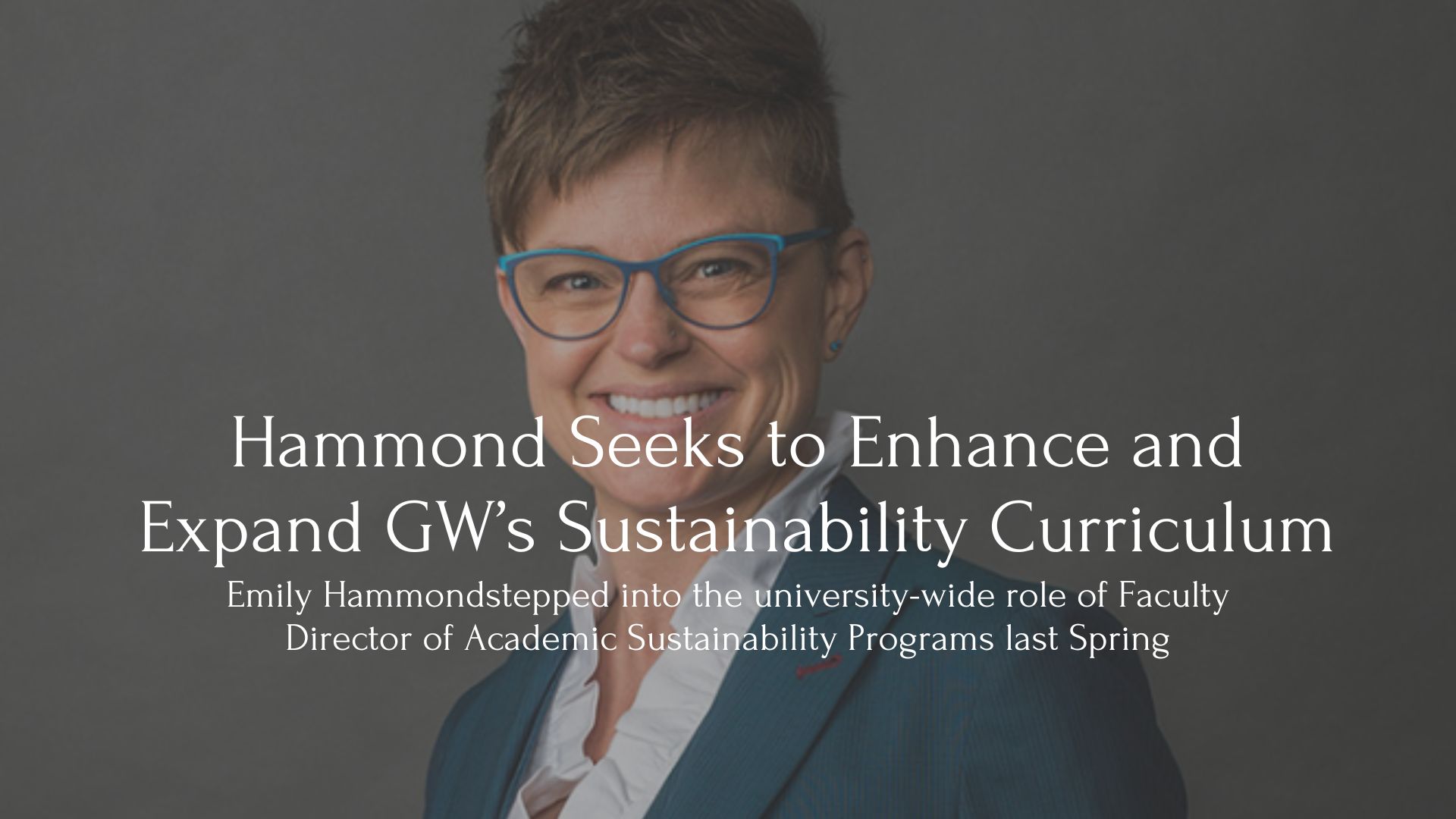Emily Hammond, Professor of Law at GW, stepped into the university-wide role of Faculty Director of Academic Sustainability Programs last Spring. Reporter Jenna Xavier talked with Professor Hammond to learn more about their plans.
Emily Hammond traces their commitment to sustainability to growing up on a sustainably managed small farm in Central Appalachia. Later, they trained and worked as an environmental engineer before becoming a law professor specializing in environmental, energy, and administrative law. Since joining GW as a law professor, Professor Hammond has also held positions as the Senior Associate Dean for Academic Affairs at GW Law; a presidential appointee at the US Department of Energy where they served as Deputy General Counsel for Litigation, Regulation, and Enforcement and Deputy General Counsel for Environment and Litigation; and GW’s Vice Provost for Faculty Affairs. They are now applying these diverse skills and experiences to building GW’s sustainability curriculum.
“I enjoy bringing a multidisciplinary lens to issues of sustainability, especially energy justice and governance,” Professor Hammond explained. It was that understanding of sustainability as a multidisciplinary subject that attracted Professor Hammond to the position of Faculty Director for Academic Sustainability Programs. Academic Sustainability Programs are part of GW’s Alliance for a Sustainable Future, a university-wide initiative dedicated to elevating sustainability academics and research while enhancing the impact of GW’s work on people, policies, and the environment. Under Professor Hammond’s leadership, Academic Sustainability Programs are working to augment the undergraduate Sustainability Minor, build a stronger community among its current students and alumni, and expand summer programs and graduate-level offerings.
One of Professor Hammond’s first initiatives was to establish a multidisciplinary, cross-University curriculum committee that would review the Sustainability Minor. In doing so, they aim to ensure that the Sustainability Minor benefits from a variety of perspectives and experiences. Among other things, the committee is considering the learning outcomes of the minor, the function of the pillar designations in serving outcomes, and how the process can support a “living, breathing curriculum.” Professor Hammond is committed to ensuring the minor aligns with and adapts to dynamic interests and global developments by convening stakeholders to refine curriculum requirements and opportunities as needed.
Professor Hammond will also work to expand sustainability program options for graduate students across GW, allowing them to hone their specialization through multidisciplinary study. This approach offers students a chance to elevate their research and create new knowledge with the benefit of cross-disciplinary collaboration. Overall, Hammond looks forward to helping ensure sustainability’s centrality to GW’s curriculum.
Professor Hammond encourages students to “let their curiosity guide them” in exploring sustainability because all disciplines bring value to the tremendous challenges we face in creating a more sustainable future. As Professor Hammond works to tailor the curriculum to today’s students, they recognize the value of flexible and accessible education methods that make classrooms more inclusive. In addition, Professor Hammond hopes to leverage GW’s strengths in sustainability communication to support greater connection and understanding among those with differing viewpoints about sustainability issues.
Professor Hammond’s expertise in academic leadership earned them the Distinguished Dean Award, bestowed by GW Law’s graduating classes of 2020 and 2021. An energetic and dedicated teacher, they were also awarded the Distinguished Faculty Service Award by the graduating class of 2018. “The Alliance was very fortunate that Emily agreed to take the role of Faculty Director for Academic Sustainability Programs,” said Donna Attanasio, Managing Director of the Alliance. “They bring a unique array of talent, perspective, and experience that will provide immeasurable value to our present and future students.”
In their own professional sphere, Professor Hammond seeks to introduce broader reform to institutions outside of the university. With interests in the clean energy transition, they hope to “leverage research findings to implement policy change outside of GW” focused on climate and energy justice. Professor Hammond’s work with the Department of Energy from 2021-2022 and ongoing research at GW provides a platform for large-scale action through policy proposals and public advocacy. Their speaking engagements this fall included an Energy Justice Conference at Howard University addressing community benefit agreements and the equitable distribution of benefits to historically marginalized communities, and their forthcoming publications consider justice issues associated with the clean energy transition.
Reflecting on the Alliance's work thus far, Professor Hammond took pride in the team's effort to foster a sense of community within DC. They highlighted events in the works for this academic year designed to engage students and inspire sustainable action. Hammond is also excited about upcoming talks, presentations, research, and the 2025 Planet Forward Summit, all aiming to unite communities in pursuit of a truly sustainable future. While enthusiastic about upcoming activities, Professor Hammond reiterated their priority—supporting a dynamic, inspirational sustainability curriculum for the GW community.


